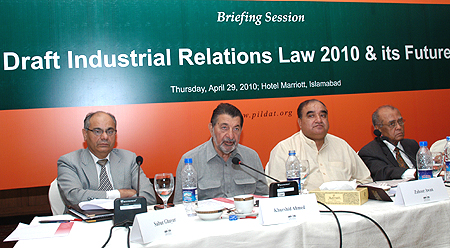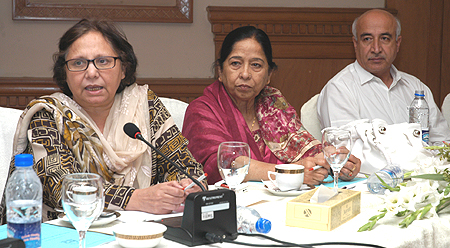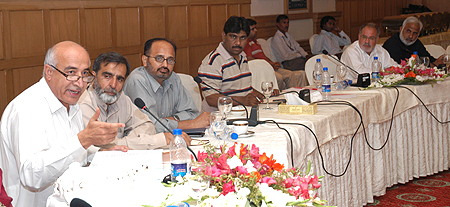|
|
| |
| EVENTS |
|
|
> Federal and Provincial Governments are urged not to allow a vacuum in Labour Laws to emerge after the expiration of IRA 2008 on April 30, 2010
|
| |
|
Briefing Session
April 29, 2010
Islamabad
|
|
| |
Islamabad, April 29: Participants of the Briefing Session, hosted by PILDAT on Draft Industrial Relations Law 2010 and its Future, urged the Federal and the Provincial Governments to bring in the new Industrial Relations Law and not to allow a vacuum in Labour Legislation to emerge after the expiration of IRA 2008 on April 30, 2010. While addressing the issue, representatives of workers and employers federations spoke that the Federal Ministry of Labour and Manpower held various consultation session with the stakeholders with an aim to introduce a mutually accepted law but at the moment when the expiration of interim IRA 2008 is due, the ministry has not come up with any legislation while after the omission of concurrent list from the Constitution of Pakistan, in the 18 Constitutional Amendment, and exclusion of labour legislation from the Federal domain, future of the due Industrial Relations law has become more uncertain. |
|
| |
Ms. Aaisya Riaz, Joint Director-PILDAT, while giving the background of the session said that The Industrial Relations Act 2008 (IRA 2008), brought in on December 14, 2008, is due to expire on April 30, 2010. The Ministry of Labour and Manpower has reportedly, been working to replace the IRA 2008 with a proposed law, which in the draft form, is known as the Trade Unions and Industrial Relations 2010. However, after the promulgation of the 18th Constitutional Amendment on April 19, 2010, the 47-subject Concurrent List has been omitted from the Constitution of Pakistan, thereby transferring these subjects, including Welfare of Labour; conditions of labour, provident funds; employers� liability and workmen�s compensation, health insurance including invalidity pensions, old age pensions, Trade Unions, Industrial and Labour Disputes, The setting up and carrying on of labour exchanges, employment information bureaus and training establishments and Regulation of labour and safety in mines, factories and oil-fields<.i> to the Provinces. In the absence of constitutional provisions to table the new legislation in Parliament, the Ministry of Labour and Manpower may consider promulgation of draft law in the shape of an ordinance
|
|
| |
Discussants of the Briefing Session raised the issue on the future of labour legislation after the omission of concurrent list from the Constitution. Senator Dr Abdul Malik, National Party, Balochistan, clarified that the process of devolutions of powers and authorities to the provinces will be completed on June 30, 2011 and Prime Minister of Pakistan has established a Cell to monitor the smooth transference of authorities to the Provinces. Mr. Asif Ezdi, Columnist, pointed out the question of authority of Federal Government to launch any legislation on the subject that is excluded from the Federal Domain. Discussants urged the Government to draw uniform Labour Legislation at the provincial level because Government of Pakistan is also a signatory of ILO fundamental conventions and to fulfil global requirements national uniformity is a dire need for labour legislation. Senator Saeeda Iqbal, Senator Surriya Amiruddin, Ms. Mehreen Razzaq Bhutto, MNA, Ms. Farah Naz Ispahani, MNA, Ms. Tasneem Siddiqui, MNA, Ms. Jamila Gillani, MNA and many members of civil society participated in the Briefing Session. The Session was organized in order to gather the input from different sections of society to assist in Labour legislation. |
|
| |
Mr. Sabur Ghayur, Chairman-CLAD, in his presentation gave the analysis of IRA 2008 along with its weakness and strengths. Labour inspection mechanism, avenues for dispute settlement and seeking resolution of grievances, freedom to organise and bargain collectively to workers in the informal economy like agriculture sector and Home Based Workers-HBWs as well as those working on contracts or through contractors should be incorporated in the new labour legislation and Tri-partism has to be institutionalised with a follow up mechanism, said Mr. Sabur Ghayur. |
|
| |
Mr. Ahsanullah Khan, Chairman-WEBCOP, said that there would be a vacuum expected after the expiration of IRA 2008 as Labour Legislation becomes a provincial subject since the country would be lacking any law addressing labour issues. He also urged the inclusive and consultative environment for Labour Legislation. |
|
| |
Labour Judiciary System and National Industrial Relations Commission are in limbo after omission of concurrent list, said Mr. Zahoor Awan, Deputy General Secretary, PWF. While talking to the Briefing Session, he said that Workers Welfare Fund and Employees Old Age Benefit Institution are national institutions and after exclusion of labour legislation from federal domain, there will be no federal government contribution and it will create restlessness among the workers of small provinces. |
|
| |
The Briefing Session was organised by PILDAT under the project titled "Capacity Building of Legislators on Labour Issues" which is supported by Solidarity Center. |
|
| |
|
|
| |
|
|
| |
|
|
| |

|
|
| |
|
|
| |

|
|
| |
|
|
| |

|
|
|
|
|
|
|
|
|